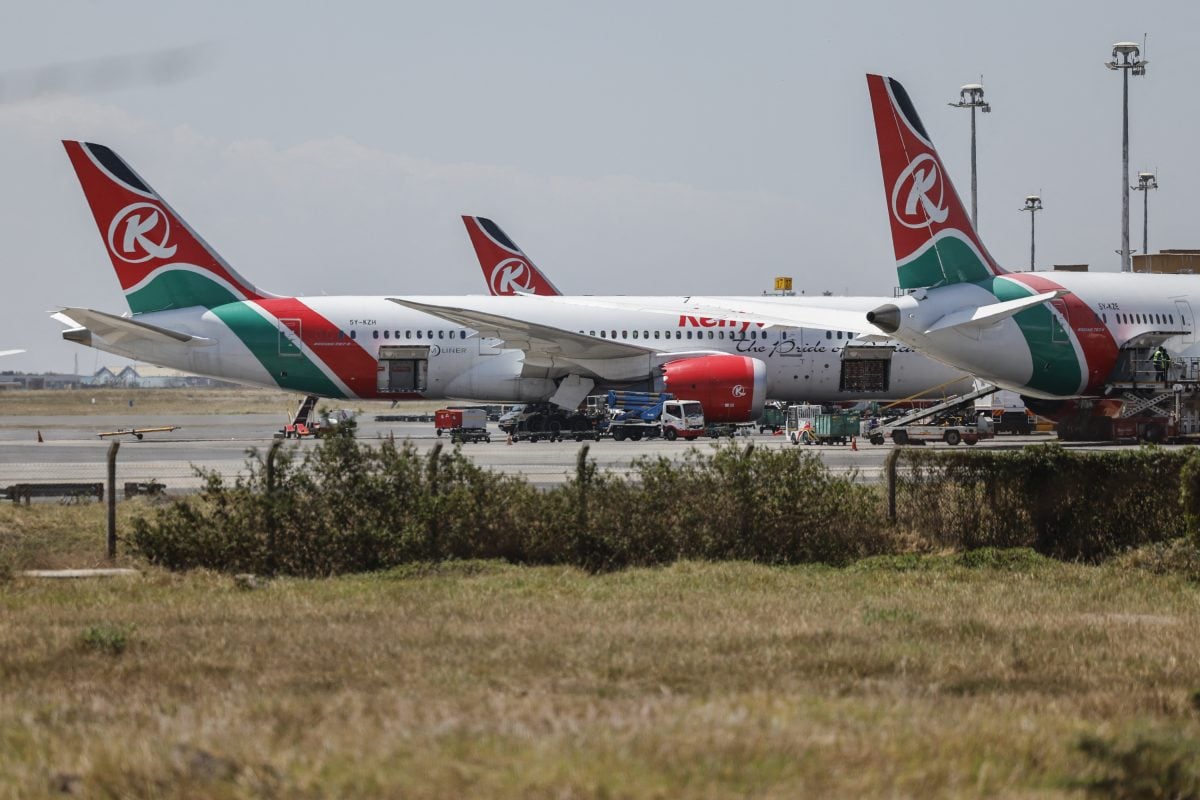Kenya Airways’ return to the Nairobi Securities Exchange this week has prompted a bullish response from investors.
Shares in the national carrier, which resumed trading on Monday after successive annual suspensions lasting about four-and-a-half-years, initially surged to a high of Sh6 (4.6 US cents).
At Sh4.76 (3.7 US cents) per share at the close of trading on Wednesday, the total market value of the airline’s outstanding shares, also known as the market cap, stood at Sh25.21 billion ($193.67m).
The shares were initially suspended from trading in July 2020 after the government proposed a new law to nationalise the airline and rescue it from mounting debts amid the Covid-19-induced slump in global air travel. At the time, shares in the carrier were worth Sh3.83 (3 US cents).
However, the nationalisation plan was shelved after the airline showed signs of recovery. Changes in government administration in 2022 also led to major policy shifts, with President William Ruto abandoning the nationalisation plan in favour of privatisation. These factors, coupled with the airline’s recent return to profitability, paved the way for its relisting on the bourse this week.
“The suspension on the trading of Kenya Airways PLC shares was lifted following the company’s recent performance which saw the company record a profit after tax and the withdrawal of the National Aviation Management Bill 2020,” the NSE said in a notice on Monday.
Profitability boosts sentiment
Analysts attribute investors’ bullish sentiment towards Kenya Airways’ stock to its latest financial performance, which suggests that it is finally turning the corner after an extended period of recurrent losses and crippling debt.
For the first half of the financial year ending June 30, 2024, the airline achieved a profit after tax of Sh513m ($3.96m) – its first profit, after taxes and debt service payments have been deducted, since 2013.
During this period, the carrier’s revenue increased 22% to Sh9bn ($69.5m), driven by a 10% rise in passenger numbers to 2.54m. It also implemented an extensive turnaround strategy focusing on cost reduction, capacity expansion and financial restructuring. These efforts resulted in a 22% decline in overheads and a substantial reduction in its debts, boosting its bottomline.
“We have focused on strengthening our core operations, enhancing our customer service, and exploring new avenues for growth. This performance positions us in good stead to navigate the challenges of the aviation industry and prepare for future growth,” Allan Kilavuka, CEO of Kenya Airways, said in August.
Restructuring debts
Kenya Airways’ financial troubles, which began over a decade ago, worsened significantly in 2017 when the airline secured an $841.6m loan from the Export-Import Bank of the United States (EXIM). The loan, $525m of which was guaranteed by the government, was used to purchase seven planes and a new engine as part of an expansion drive.
However, the strengthening of the dollar against the shilling in the subsequent years caused the airline’s finance costs for the dollar-denominated facility to balloon, plunging it deeper into losses.
In 2022, the Kenyan government intervened by taking on the debt, converting it to local currency, and restructuring the tenure, thereby providing the airline with much-needed relief.
After converting debt into equity, local commercial banks own around 38.1% of the company. The Kenyan government holds the largest stake at 48.9%, while KLM Royal Dutch Airlines (7.8%) and minority shareholders (2.8%) also have interests in the carrier.
Search for strategic investor
While the reduction in debt and focus on efficiency has helped Kenya Airways to swing back to profitability, analysts warn that investors should not overlook the risks associated with the airline’s negative book value. A negative book value means that a company’s liabilities are greater than its assets.
“The improved turnaround of KQ (Kenya Airways) sets the pace for investors to price in the recovery performance going forward. But the companies’ biggest problem may be the negative book valuation that may slow down the bullish activities of the stock,” said Ronny Chokaa, an analyst at Capital A Investment Bank, told The Africa Report.
Kenya Airways last reported a negative book value of Sh123.6bn ($954m), highlighting the extensive impact of years of successive losses on its overall financial health.
The airline has long been scouting for a strategic investor to help rescue it from financial distress, with the government expressing willingness to cede ownership to a private investor capable of restoring the airline’s fortunes. However, despite management’s previous reports of being in the “final stages” of securing a strategic investor, the airline has yet to announce one.
Want to continue reading? Subscribe today.
You've read all your free articles for this month! Subscribe now to enjoy full access to our content.
Digital Monthly
£8.00 / month
Receive full unlimited access to our articles, opinions, podcasts and more.
Digital Yearly
£70.00 / year
Our best value offer - save £26 and gain access to all of our digital content for an entire year!

 Sign in with Google
Sign in with Google 



